| Author | Message | ||
Kola Moderator Username: Kola Post Number: 1480 Registered: 02-2005 Rating: |
 ****From his biography...to the gay life... to his masterful works...to feud with Richard Wright With PHOTOS and information, we SALUTE James Baldwin.... LISTEN TO AUDIO INTERVIEWS OF JAMES BALDWIN: 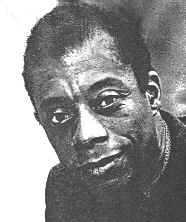 James Baldwin: Talk at Berkeley High School, April 17, 1974? Listen to it with Real Audio: http://sunsite.berkeley.edu/VideoTest/baldwinberkeleyhs.ram Listen to James Baldwin at Berkeley University in 1979: http://sunsite.berkeley.edu/VideoTest/baldwinblum.ram  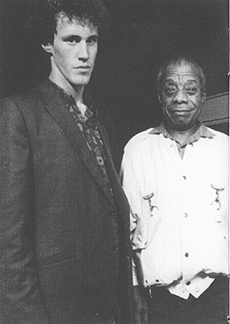 WHO WAS JAMES BALDWIN: American writer, noted for his novels on sexual and personal identity, and sharp essays on civil-rights struggle in the United States. Baldwin also wrote three plays, a children's storybook, and a book of short stories. He gained fame with his first novel, GO TELL IT ON THE MOUNTAIN (1953), a story of hidden sins, guilt, and religious torments. In this and subsequent works Baldwin fused autobiographical material with analysis of social injustice and prejudices. Several of his novels dealt with homosexual liaisons. "If we do not now dare everything, the fulfillment of that prophecy, re-created from the Bible in song by a slave, is upon us: God gave Noah the rainbow sigh, No more water, the fire next time!" (from The Fire Next Time, 1963) James Baldwin was born in Harlem, New York City, as the son of a domestic worker. Illegitimate, he never knew his own father and was brought up in great poverty. When he was three, his mother married a factory worker, a hard and cruel man, who also was storefront preacher. Baldwin adopted the surname from his stepfather, who died eventually in a mental hospital in 1943. In his childhood Baldwin was a voracious reader. When he was about twelve his first story appeared in a church newspaper. At the age of 17 Baldwin left his home. After graduation from high school, he worked in several ill-paid jobs and started his literary apprenticeship. "And it seemed to me, too, that the violence which rose all about us as my father left the world had been devised as a corrective for the pride of his eldest son, I had declined to believe in that apocalypse which had been central to my father's vision; very well, life seemed to be saying, here is something that will certainly pass for an apocalypse until the real thing comes along. I had inclined to be contemptuous of my father for the conditions of his life, for the conditions of our lives. When his life had ended I began to wonder about that life and also, in anew way, to be apprehensive about my own." (from Notes of a Native Son, 1955) In the early 1940s Baldwin was in defense work in Belle Meade, New Jersey, and in 1943 he began writing full-time. His book about the store-front churches in Harlem with the photographer Theodore Pelatowski did not gain success. In 1945 he had his first encounter with the FBI, in Woodstock, where he was living in a cabin the the woods. He was interrogated by two men about a deserter. Baldwin had met him at a party, very briefly, and gave the agents the name, Teddy. Afterwards Baldwin felt like being gang-raped, "but they made me hate them, too, with a hatred like hot ice..." (from The Devil Finds Work, 1976) "Any writer, I suppose, feels that the world into which he was born is nothing less than a conspiracy against the cultivation of his talent--which attitude certainly has a great deal to support it." (Baldwin in Collected Essays, 1998) Although publishers rejected his work, Baldwin's book reviews and essays in The New Leader, The Nation, Commentary, and Partisan Review, together with the help of Richard Wright, won him a Rosenwald Fellowship in 1948. Baldwin's strained relations with his stepfather, problems over sexual identity, suicide of a friend, and racism drove him in 1948 to Paris and London. During this period Baldwin finished the novel Go Tell It on the Mountain and wrote the play THE AMEN CORNER (1955). He lived in Europe ten years, mainly in Paris and Istanbul, and later spent long periods in New York. In 1957 he returned to the U.S. in order to become involved in the Southern school desegregation struggle. Go Tell It on the Mountain was based on the author's experiences as a teenage preacher in a small church. Baldwin had found release from his poor surroundings through a Pentecostal church. He was converted at age fourteen and served in the church as a minister for three years. Baldwin depicted two days in the life of the Grimes family. The 14-year- old John is a good student, religious, and sensitive. "Everyone had always said that John would be a preacher when he grew up, just like his father. It had been said so often that John, without ever thinking about it, had come to believe it himself." He has a long series of conflicts with his brutal stepfather, Gabriel, a preacher, who had fathered an illegitimate child in his youth. His mother has her own secrets. John's spiritual awakening unites the family but only superficially - John becomes ready to carry his own weight. Feelings of strangeness and helpless anger troubled Baldwin during his years in Europe. In an essay, 'Stranger in the Village' (1953), he depicts his visit to a tiny Swiss village. He realizes that the people of the village cannot be, from the point of view of power, strangers anywhere in the world. The children consider him an exotic rarity and shout Neger! Neger! in the streets without being aware of his reaction under the smile-and-the-world-smiles-with-you routine. Despite the saluts and bonsoirs, which Baldwin changed with his neighbors, he also sees in their eyes paranoiac malevolence - there is no European innocence, and the ideas which American beliefs are based on, originated from Europe. "For this village brings home to me this fact: that there was a day, and not really a very distant day, when Americans were scarcely Americans at all but discontented Europeans, facing a great unconquered continent and strolling, say, into a marketplace and seeing black men for the first time." In Baldwin's second novel, GIOVANNI'S ROOM (1956), the theme was a man's struggle with his homosexuality. David, the narrator, tells his story on a single night. He is a young, bisexual American, Giovanni is his Italian lover, who is to be executed as a murderer, and Hella his would-be wife. "But people can't, unhappily, invent their mooring posts, their lovers and friends, anymore than they can invent their parents. Life gives these and also takes them away and the great difficulty is to say Yes to life." NOBODY KNOWS MY NAME (1962), a collections of essays, explored among others black-white relations in the U.S., William Faulkner's views on segregation, and Richard Wright's work. Wright had encouraged Baldwin when he was an aspiring writer but they never became close friends. The book became a bestseller as THE FIRE NEXT TIME (1963), in which the author appraised the Black Muslim (Nation of Islam) movement, and warned that violence would result if white America does not change its attitudes toward black Americans. Baldwin's reports on the civil rights activities of the 1960s made him special target of the U.S. Federal Bureau of Investigation, that alone accumulated a 1750-page file on him. In the title essay of NOTES OF A NATIVE SON (1955) Baldwin took examples from his own family and the Harlem riot of 1943 to describe the experience of growing up black in America. ANOTHER COUNTRY (1962), a novel, was criticized for its thin characters. The protagonist is a black jazz drummer, who kills himself in despair after disappointments in love and life. TELL ME HOW LONG THE TRAIN'S BEEN GONE (1968) was according to Mario Puzo "a simpleminded, one-dimensional novel with mostly cardboard characters" (The New York Times, June 23, 1968). Again Baldwin had an artist as the protagonist: he is now Leo Proudhammer, a famous actor. Leo's early years in Harlem are depicted in flashbacks. He shares in Greenwich Village a living space with a white, unmarried couple, Barbara and Jerry. Leo and Barbara become lovers but ultimately Leo gains a new life through his love for a young black militant named Christopher, a Malcolm X-like figure. "Joyce is right about history being a nightmare - but it may be the nightmare from which no one can awaken. People are trapped in history and history is trapped in them." (from 'Stranger in the Village') After the assassination of Martin Luther King in 1968 and drawbacks in civil-rights movement, Baldwin started bitterly to acknowledge that violence may be the only route to racial justice. Some optimism about peaceful progress would later return, but in the early 1970s he also suffered from writer's block. In a review of Alex Haley's novel Roots Baldwin looked the work through the possibilities of a presidential election year and stated that "the black people of this country bear a mighty responsibility--which, odd as it may sound, is nothing new--and face an immediate future as devastating, though in a different way, as the past which has led us here: I am speaking of the beginning of the end of the black diaspora, which mean that I am speaking of the beginning of the end of the world as we have suffered it until now" (The New York Times, September 26, 1976). IF BEALE STREET COULD TALK (1974) showed Baldwin's artistic renewal in a moving and poetic love story of a young talented sculptor, Alonzo Hunt, called Fonny, and his pregnant girlfriend, Tish, the narrator. Fonny is twenty-two, Tish is nineteen. He is accused of a rape, but he is innocent, and Tish struggles to get him free. Baldwin emphasized the importance of family bonds and the simple power of love as a means of survival. Music, which played a minor role in Go Tell It on the Mountain, moved to the fore in JUST ABOVE MY HEAD (1979), Baldwin's sixth and longest novel. It focused on the lives of a group of friends, who start out preaching and singing in Harlem churches. Among the central characters is Arthur Montana, a gospel singer. Arthur's story, the decline of his career, is told by his brother Hall, whose balanced middle-class life is far from the religious turmoils of the Grimes family. African American music in general influenced deeply Baldwin, which is seen also from the titles of his books and their allusions to traditional African American songs. EVIDENCE OF THE THINGS SEEN (1983) was an account of unsolved murder of 28 black children in Atlanta in 1980 and 1981. The work, written mostly as an assignment for Playboy, again disappointed the critics. In 1983 Baldwin became Five College Professor in the Afro-American Studies department of the University of Massachusetts at Amherst. He spent his latter years in St. Paul de Vence on the Riviera, France, where he died of stomach cancer on November 30, 1987.  During his long career, Baldwin never concealed his sexuality. He rejected the label "gay," saying that he was open to love, no matter what form or gender it might take. Baldwin understood the inner struggles against homophobia that gay and bisexual people experience and wrote about them in his groundbreaking 1956 novel, Giovanni's Room. Today, many believe this to be the finest novel about same-sex desires ever written. _______________________ "Go Tell It On the Mountain" A NOVEL by James Baldwin   Go Tell It on the Mountain was his first published novel, and many critics feel that it is has stood as his best. It is a traditional bildungsroman, a novel tracing the psychological and spiritual development of its central character, John Grimes. In the first chapter, John's family life, ruled by anger, poverty and guilt, is explored, leading to the fifth chapter, when, after night's religious service, John is accepted into his church's community because he has undergone a seizure-like conversion, writhing on the floor and speaking in foreign tongues. The middle chapters give the background stories of his aunt, his father, and his mother, who migrated to New York from the South and endured various difficulties that are reflected in John's life. There is a strong autobiographical aspect to the novel, as many of the details in John's life mirror those in Baldwin's life, including his impoverished upbringing in Harlem, his angry vitriolic father, his fascination with an older male church member and his religious conversion at age fourteen. Explaining how writing ills first novel helped him come to terms with the troubled he faced growing up, Baldwin said, "Mountain was the book I had to write if I was ever going to write anything else." 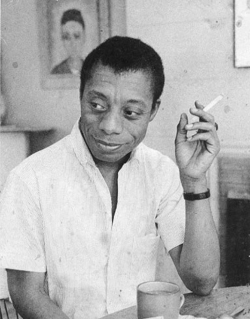 CRITICAL PERSPECTIVES OF JAMES BALDWIN'S WORK Contributing Editors: Trudier Harris and John Reilly Classroom Issues and Strategies Problems surround Baldwin's voicing the subjectivity of characters, the great sympathy he awards to the outlook of the marginalized. Students normally meet the underclass as victims perhaps objectified by statistics and case studies. For that matter, students who are not African-American have difficulty with the black orientation arising from Baldwin's middle-class characters: the artists and other, more conventionally successful people. The strategies flow from the principle that people do not experience their lives as victims, even if Baldwin's popular social autobiographical essay Notes of a Native Son --the portion where he recounts contracting the "dread, chronic disease" of anger and fury when denied service in a diner--might be useful in raising the issue of why Baldwin says every African-American has a Bigger Thomas in his head. The anger may become creative, as might the pain. A companion discussion explores the importance of blues aesthetic to Baldwin: the artful treatment of common experience by a singular singer whose call evokes a responsive confirmation from those who listen to it. In addition, an exploration of the aesthetic of popular black music would also enhance the students' understanding. Within a literary context, the strategies should establish that fictional narrative is the only way we know the interior experience of other people. The imagination creating the narrative presents an elusive subjectivity. If a writer is self-defined as African-American, that writer will aim to inscribe the collective subjectivity under the aspect of a particular character. Of course, the point is valid for women writers and other groups also, as long as the writers have chosen deliberately to identify themselves as part of the collective body. Major Themes, Historical Perspectives, and Personal Issues Themes of personal importance include the significance of community identification, the communion achieved in "Sonny's Blues," for example; the conflicted feelings following success when that requires departure from the home community; the power of love to bridge difference. The chief historical issue centers on the experience of urbanization following migration from an agricultural society. The philosophical issue concerns Baldwin's use of religious imagery and outlook, his interest in redemption and the freeing of spirit. Interestingly, this philosophical/religious issue is often conveyed in the secular terms of blues, but transcendence remains the point. Significant Form, Style, or Artistic Conventions Baldwin's frequent use of the first-person narration and the personal essay naturally associates his writing with autobiography. His fiction should be discussed in relation to the traditions of African-American autobiography which, since the fugitive slave narratives, has presented a theme of liberation from external bondage and a freeing of subjectivity to express itself in writing. As for period, his writing should be looked at as a successor to polemical protest; thus, it is temporally founded in the 1950s and 1960s. Original Audience In class I ask students to search out signs that the narrative was written for one audience or the other: What knowledge is expected of the reader? What past experiences are shared by assumption? Incidentally, this makes an interesting way to overcome the resistance to the material. Without being much aware that they are experiencing African-American culture, most Americans like the style and sound of blues and jazz, share some of the ways of dress associated with those arts and their audiences, and know the speech patterns. Comparisons, Contrasts, Connections One can make a comparison with Herman Melville's Benito Cereno and Richard Wright's Native Son. The basis is the degree of identification with African-Americans accomplished in each. How closely does the writer approach the consciousness of the black slave and street kids? Measure and discuss the gap between the shock felt by Delano and the communion of the brothers in Baldwin's story. Questions for Reading and Discussion/ Approaches to Writing Keeping in mind that James Baldwin's first experiences with "the word" occurred in evangelical churches, see if that influences his use of the "literary word." What does Baldwin's short story tell you about the so-called ghetto that you could not learn as well from an article in a sociology journal? College students are responsive to questions of the ethics of success. They may raise it with this story of "Sonny's Blues" by wondering why the narrator should feel guilty and even by speculating about what will happen to the characters next. ___________________ JAMES BALDWIN VS. RICHARD WRIGHT 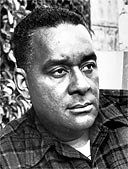 James Baldwin vs. Richard Wright: Language as a “Key to Identity” African American writer James Baldwin wrote an assay in 1979 viewing his ideas about the importance of language as a “key to identity” and to social acceptance. Evidence from the book Black Boy, written by Richard Wright, will help to defend Baldwin’s ideas by using diction to make you think and feel. In Baldwin’s essay he says, “There have been, and are, times, places, when to speak a certain language could be dangerous, even fatal.” In the book Black Boy there is a scene where just two words almost cost the boy his life. “The car started. It was full of young white men. They were drinking. I watched the flask pass from mouth to mouth. ‘Wanna drink, boy?’ one asked. The memory of my six-year-old drinking came back and filled me with caution. But I laughed, the wind whipping my face. ‘Oh, no!’ I said.” Before he knew it the men had thrown out their empty whisky bottle, which smashed him right between the eyes. He fell backwards off the speeding car, becoming entangled in the spokes of his bike, landing hard onto the dust in the road. The white men stopped and got out of their car and stood over him. “’Nigger, ain’t you learned no better sense’n that yet?’” asked the man who hit him. “’Ain’t you learned to say sir to a white man yet?’” They eventually gave up on harassing him and asked if he wanted to ride to town or not. He said no. As they were walking away one of them cautioned him by saying, “’Nigger, you sure ought to be glad it was us you talked to that way. You’re a lucky bastard, ‘cause if you’d said that to some other white man, you might’ve been a dead nigger now.’” This quote helps to prove Baldwin’s point. You might’ve been a dead nigger now…this shows just how fatal those two words could have been for a young black male. The diction in this scene helps us to see the hurtful ways white people treated blacks. It also helps set the mood so we see the type of language the whites use and also how the blacks talked. By the white man calling the black male a “nigger” Richard Wright addresses our emotions. By the white man saying that he is trying to “put down” the black boy. It is an insult. It was to let the black male know his place when comparing himself to the white man. The whites were looking down upon him. In this scene Wright also uses logos. He approaches logic by saying, “I was learning rapidly how to watch white people, to observe their every move, every fleeting expression, how to interpret what was said and what left unsaid.” By him thinking all this out it helps him in the long run. To figure out how to act around the white people and what to say then he wont ever get into another predicament like this one again. Hopefully. By comparing Baldwin’s passage and Wright’s scene it helps to prove that the importance of language is life or death sometimes. And that a certain way you talk could change your entire lifestyle. | ||
Kola Moderator Username: Kola Post Number: 1481 Registered: 02-2005 Rating: N/A |
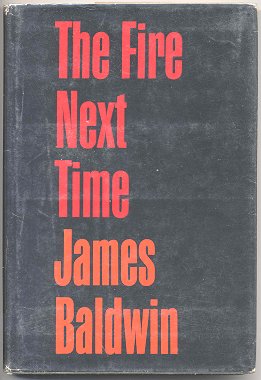 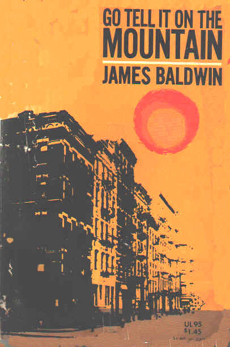 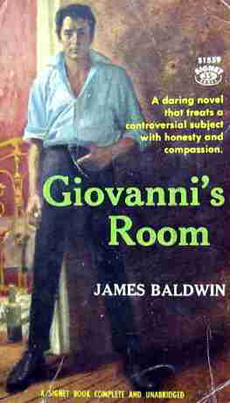 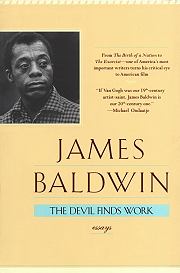 | ||
Abm "Cyniquian" Level Poster Username: Abm Post Number: 3383 Registered: 04-2004 Rating: N/A |
Kola, Nice thread. Baldwin is my favorite author. There was such blistering energy and purpose to his writing that it was like a separate living thing unto itself. You got the sense he loved not only what he wrote but that most noble, defiant act of writing in of itself. Baldwin was an honest seeker and observer, not only of the world but, perhaps mostly importantly, of himself. I miss James Baldwin. I miss the artist, the man and the idea. | ||
Abm "Cyniquian" Level Poster Username: Abm Post Number: 3395 Registered: 04-2004 Rating: N/A |
You always get the sense with Baldwin's writing that you're traveling along a journey of self-actualization and spiritual reconciliation that is both his and yours. | ||
Kola Moderator Username: Kola Post Number: 1490 Registered: 02-2005 Rating: N/A |
ABM you are SUCH a wonderful writer yourself. That last post of yours---sent chills down my spine. You should AT LEAST be a book reviewer of serious literature and Music. Can you write a serious essay ABOUT ME? Sort of a critique of the "Public Kola Monster"---sort of like what was written in the POST about Michael Jackson that I posted. Please consider it. You wouldn't have to put your real name on it---and it would be PUBLISHED in my upcoming autobiography.....at the end of the book they're publishing a series of "Critical Perspectives", mostly from Academics. We already have essays about my WORK...but none about "me" as a Pop Culture figure. | ||
Bleekindigo "Cyniquian" Level Poster Username: Bleekindigo Post Number: 216 Registered: 06-2004 Rating: N/A |
Yes, Kola!! Wonderful thread! Baldwin. I read him everyday. Bleek- | ||
Kola Moderator Username: Kola Post Number: 1491 Registered: 02-2005 Rating: N/A |
OH MY GOD!!!!!! Bleek, where have you been???? I missed you so much! Thanks so much for posting! We love you around here, girl!!! | ||
Abm "Cyniquian" Level Poster Username: Abm Post Number: 3399 Registered: 04-2004 Rating: N/A |
Kola, Thanks for the compliment. (You are such the seductress.) Okay. Give me some idea about the format, detail and word length and I'll see what I can do. | ||
Bleekindigo "Cyniquian" Level Poster Username: Bleekindigo Post Number: 217 Registered: 06-2004 Rating: N/A |
Hi Kola, Chile!! I am always here!! Always reading and giggling and being astonished and baffled and inspired and wonderfully entertained!! I love you guys!!!! Bleek- | ||
Abm "Cyniquian" Level Poster Username: Abm Post Number: 3405 Registered: 04-2004 Rating: N/A |
Howdy Bleekindigo! Nice to see yah. Where you been, kid? You been missed. I hope you and Brelei are doing well. | ||
Cynnique Unregistered guest Rating: N/A |
Whassup, Bleek! | ||
Kola Moderator Username: Kola Post Number: 1509 Registered: 02-2005 Rating: N/A |
ABM SAID: Okay. Give me some idea about the format, detail and word length and I'll see what I can do. ______________________ ABM, after my autobiography ENDS..... they have a section at the back of the book called "SCRAP BOOK", which features, among other things, a few ESSAYS about my "novels" by FEMALE Professors ---I would like YOU to write an essay (any length you wish--your own title, whatever)---NOT ABOUT MY WORK---but about the dilemna of how the public/my detractors PERCEIVE ME as opposed to how YOU perceive me. Also, I'm hoping that you can leave a kind of Historical View (imagine someone reading this book 50 years from now) on how I contrasted or complimented POP CULTURE of the early 2000's---or how I didn't fit in, however you see it. I want no Politically Correct shit---just talk like you do here, talk about my tits, about WHATEVER you feel is pertinent in getting across a message ....and the MAIN REASON I'm asking "YOU" to do it.....is because I know that you aren't intimidated by me or starstruck........AND YOU KNOW ME.....so I know that you will be BRUTALLY HONEST, which is what I like when I pay $25 to read a book. If you want, we can just credit the article to "ABM, the Kool Room".......it's totally up to you. **It will be published, although DOK is only willing to pay royalties on the essays, not an advance. I want you to do it, because it will CEMENT us as Maddie and "that guy" in the historical annals and would be perfect "personal" touch to the SCRAP BOOK. GEE----wouldn't it be HOT if Cynique would actually write one, too????? Totally saying whatever she wants to say about Kola Boof???? GOD. I wonder would she? | ||
Kola Moderator Username: Kola Post Number: 1510 Registered: 02-2005 Rating: N/A |
You and Cynique are BOTH excellent writers, so we totally trust your own instincts about how long it should be..........and TRUST ME.........after all the shit I write about in the actual memoirs ...you may as well just let loose and write whatever you want to. This would be the perfect opportunity for Cynique to remind the PLANET that I am NOT ..her Mother/daughter image, etc. LOL | ||
Kola Moderator Username: Kola Post Number: 1512 Registered: 02-2005 Rating: N/A |
DUE DATE: You have until August 1st to turn in the essay. Just email to: robert_wright@doorofkushbooks.com kolaboof_email@yahoo.com | ||
Kola Moderator Username: Kola Post Number: 1513 Registered: 02-2005 Rating: N/A |
The book is SUPPOSED to come out in November 2005. | ||
Abm "Cyniquian" Level Poster Username: Abm Post Number: 3428 Registered: 04-2004 Rating: N/A |
Kola, That's fine. You'll get a draft from me within a week. And I consider it a great honor that you presume what I create to be worthy of inclusion within what is sure to be a most wondrous book. Thank you, My Sister. | ||
Kola Moderator Username: Kola Post Number: 1514 Registered: 02-2005 Rating: N/A |
ABM--- in other words, WHAT WAS IT LIKE for a well-read intellectual guy like yourself (who shared Kola's sense of humor) to actually KNOW KOLA...and what was she REALLY like? What did you two disagree about? _______ When writing "Non-fiction", I always think of how it will be READ 50 to 100 years later. This brings out the best juices and flavors and gets you to really THINK how you want me to be remembered as a "person". | ||
Abm "Cyniquian" Level Poster Username: Abm Post Number: 3437 Registered: 04-2004 Rating: N/A |
Kola, You know I'll do what I can. But you must dippin' into some of your choice bar stock again if you think our friendly neighborhood Kola-Killer Cynique will lift a figure to help further your literary fortunes. Haven't you been paying attention the last 3 years? | ||
Cynnique Unregistered guest Rating: N/A |
I fail to see how an essay by me would further Kola's literary fortunes, ABM. And if you think one by you will, you're kidding yourself. I don't really have a definitive impression of Kola because I've never met her or been able to observe her in person. All I do is react and respond to what she says. | ||
Abm "Cyniquian" Level Poster Username: Abm Post Number: 3439 Registered: 04-2004 Rating: N/A |
Cynique, How sad...' | ||
Cynnique Unregistered guest Rating: N/A |
Why? |